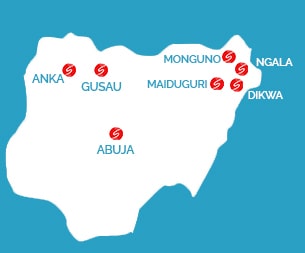Nigeria has been hit by a cholera epidemic for several months. In its most serious form, this highly virulent disease is characterized by the sudden onset of acute diarrhea, which can lead to death by severe dehydration. Since the beginning of the year, more than 102,684 suspected cases, including 3,519 deaths, have been counted by the Nigeria Center for Disease Control.
The disease is transmitted by either drinking tainted water, eating food contaminated by the vibrio cholerae bacteria, or by physical contact with a carrier or a person infected with the bacteria. The cholera vibrio is transmitted from hand to hand, then from hand to mouth.
Access to clean drinking water, quality sanitation, and hygiene play a major role in controlling the epidemic. This is exactly the means of action implemented by our on-site teams in reaction to the ongoing crisis.
SOLIDARITES INTERNATIONAL, an expert NGO in fighting epidemics, is implementing water chlorination operations, rehabilitating water supplies, disinfecting homes, distributing soap, and promoting hygiene in three hard-hit states in the North East, Borno, Adamawa and Yobe, as well as in the North West, in the State of Zamfara.
The NGO has also been responsible for coordinating the response to the epidemic in the northeastern states. According to Raphaëlle Goepfert, responsible for operations in Nigeria for SOLIDARITES INTERNATIONAL, fighting the epidemic “involves managing the information collected on site, facilitating response mechanisms, and harmonizing partner and stakeholder collaboration regarding the implementation of water, sanitation, and hygiene policies.”
Although the epidemic has slowed down significantly in recent weeks, it is not over yet and SOLIDARITÉS INTERNATIONAL is calling for a continued focused response in the areas still affected.
Nigeria
Context and action- 216.7 million inhabitants
- 163rd out of 191 countries on the Human Development Index
- 196.907 people helped

